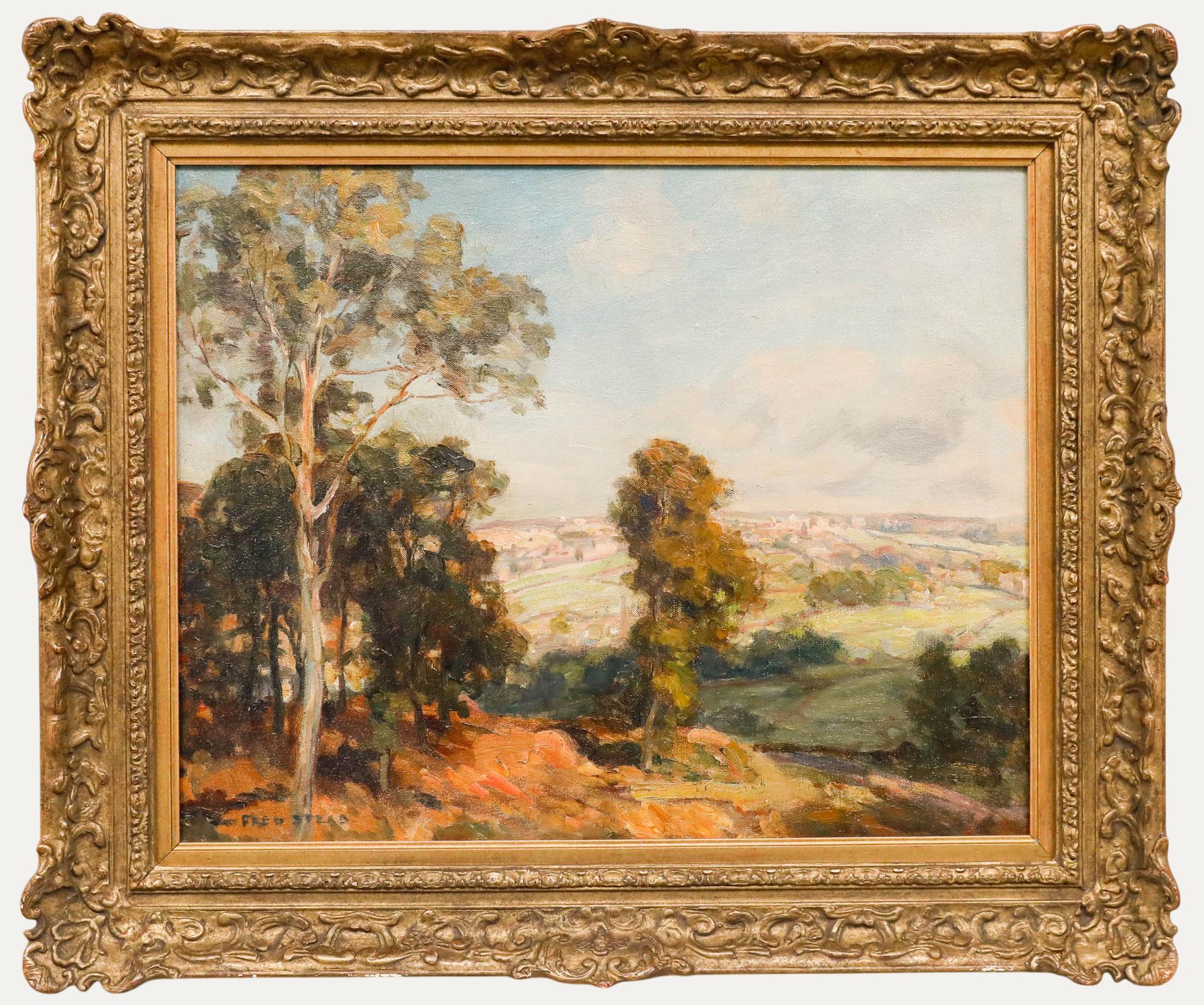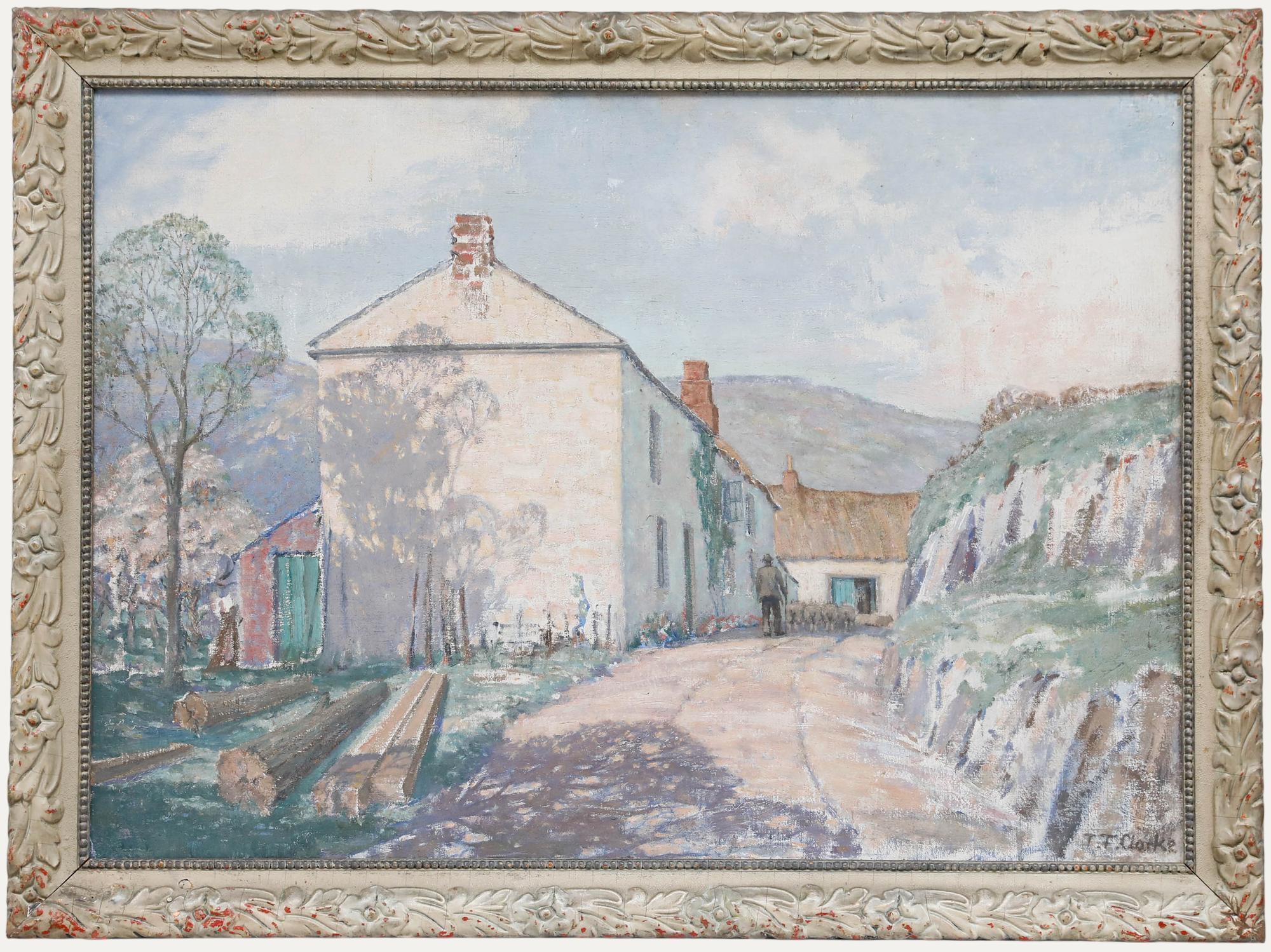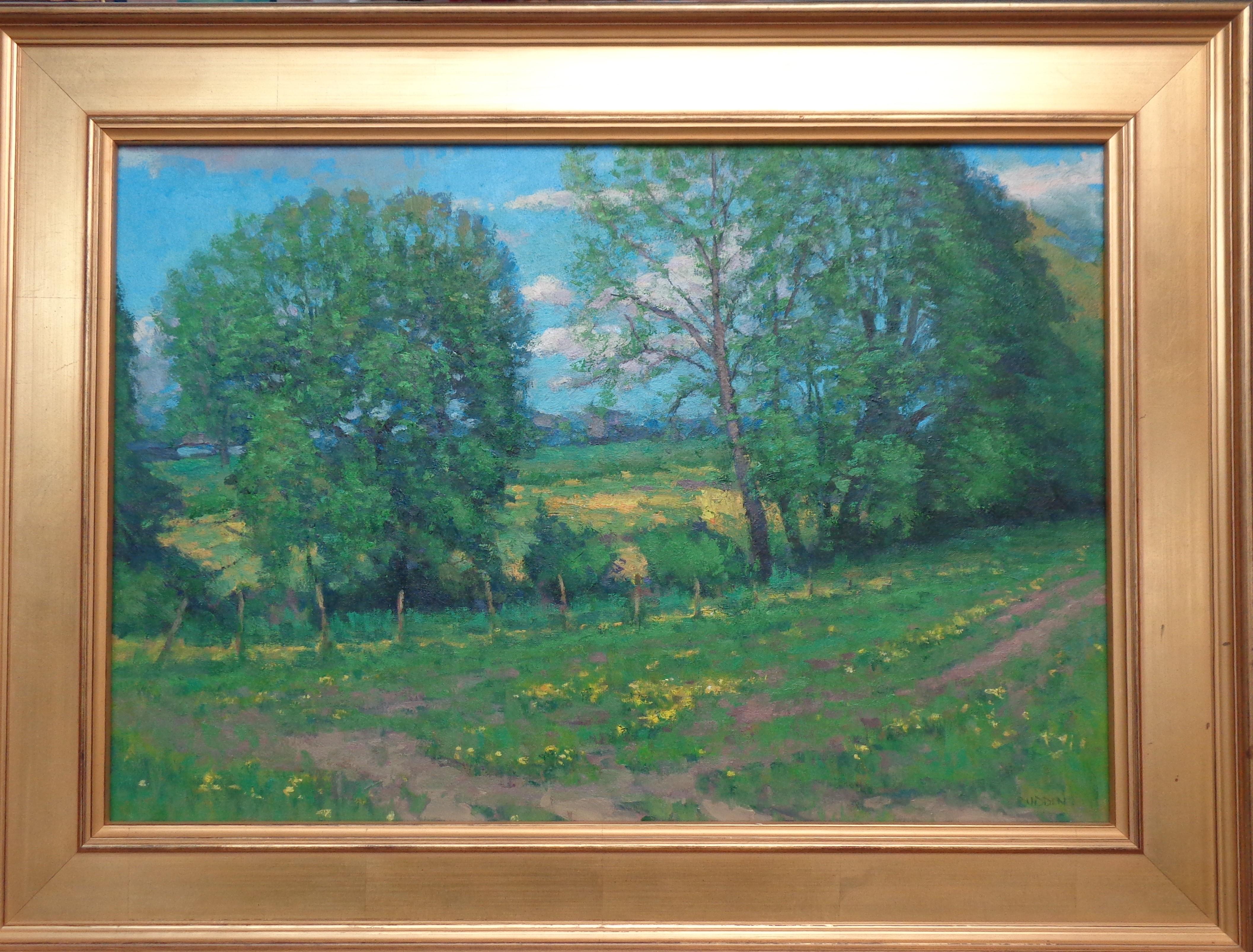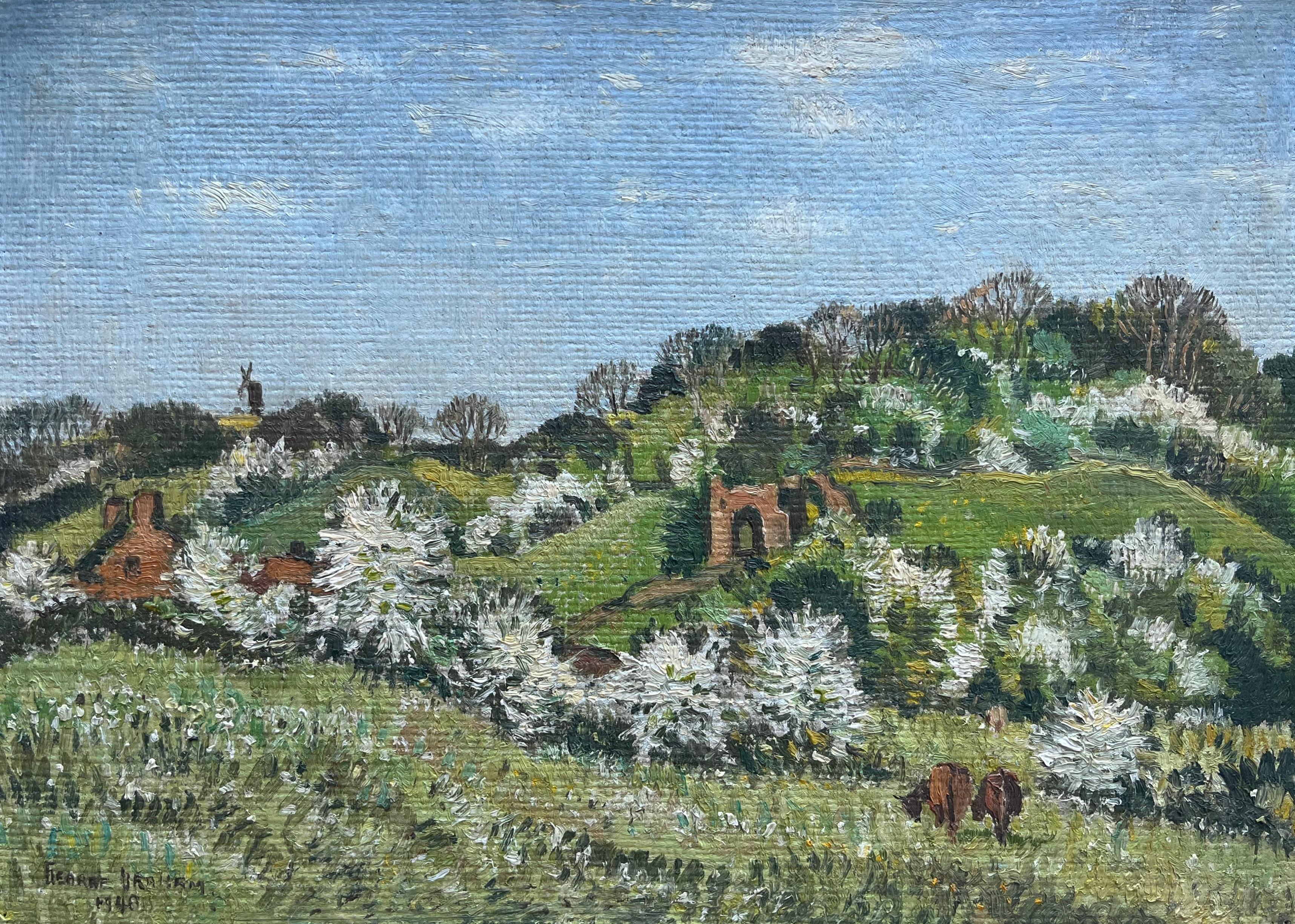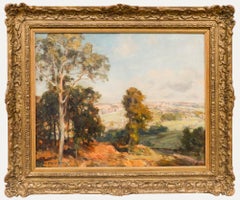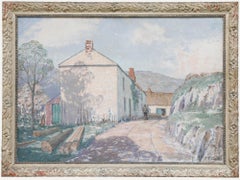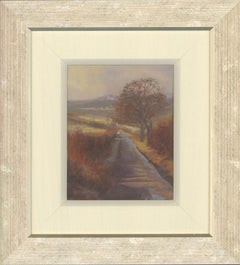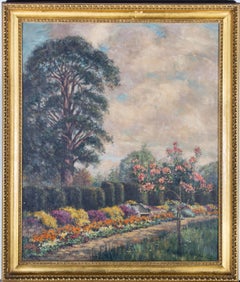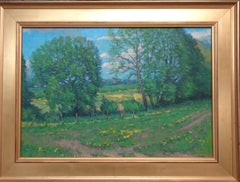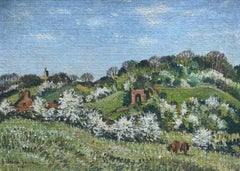Items Similar to A. E. Askwith - 1913 Oil, In the Springtime, Gomersal
Want more images or videos?
Request additional images or videos from the seller
1 of 9
A. E. AskwithA. E. Askwith - 1913 Oil, In the Springtime, Gomersal1913
1913
$337.60
$42220% Off
£256.30
£320.3820% Off
€293.72
€367.1520% Off
CA$479.18
CA$598.9720% Off
A$522.66
A$653.3320% Off
CHF 274.57
CHF 343.2120% Off
MX$6,323.15
MX$7,903.9320% Off
NOK 3,434.94
NOK 4,293.6720% Off
SEK 3,243.26
SEK 4,054.0820% Off
DKK 2,192.40
DKK 2,740.4920% Off
About the Item
An impressionistic landscape of springtime in Gomersal, West Yorkshire. Presented in a wooden frame with gilt-effect slip. Signed and dated to the lower-right corner. Inscribed with the title to the reverse. On canvas on stretchers.
- Creator:A. E. Askwith
- Creation Year:1913
- Dimensions:Height: 20.48 in (52 cm)Width: 24.41 in (62 cm)
- Medium:
- Period:
- Condition:Some minor surface dirt and small scuffs to the slip. Overall in very good condition for a painting of this age. Inspection under UV light reveals no restoration.
- Gallery Location:Corsham, GB
- Reference Number:Seller: qk5271stDibs: LU881310181302
About the Seller
4.9
Platinum Seller
Premium sellers with a 4.7+ rating and 24-hour response times
Established in 2010
1stDibs seller since 2018
1,363 sales on 1stDibs
Typical response time: 2 hours
- ShippingRetrieving quote...Shipping from: Corsham, United Kingdom
- Return Policy
Authenticity Guarantee
In the unlikely event there’s an issue with an item’s authenticity, contact us within 1 year for a full refund. DetailsMoney-Back Guarantee
If your item is not as described, is damaged in transit, or does not arrive, contact us within 7 days for a full refund. Details24-Hour Cancellation
You have a 24-hour grace period in which to reconsider your purchase, with no questions asked.Vetted Professional Sellers
Our world-class sellers must adhere to strict standards for service and quality, maintaining the integrity of our listings.Price-Match Guarantee
If you find that a seller listed the same item for a lower price elsewhere, we’ll match it.Trusted Global Delivery
Our best-in-class carrier network provides specialized shipping options worldwide, including custom delivery.More From This Seller
View AllFrederick Stead (1863-1940) - Early 20th Century Oil, Across the Autumn Dales
By Frederick Stead
Located in Corsham, GB
A delightful landscape painting of the Yorkshire Dales by British artist Frederick (Fred) Stead (1863-1940). The composition features leafy autumn trees framing a sunlit view of the ...
Category
20th Century Landscape Paintings
Materials
Oil
Thomas Flowerday-Clarke (1877-1953) - Oil, An Early Morning in Spring, Coombe
Located in Corsham, GB
This charming landscape painting depicts a quaint rural scene, with a prominent white stone farmhouse nestled among rolling hills and verdant countryside. The artist's delicate brush...
Category
Mid-20th Century Landscape Paintings
Materials
Oil
Colin Robertson - Signed Mid 20th Century Oil, Spring Lane
Located in Corsham, GB
A delightful oil scene of a quiet country road, we can see the orange tones reflected off the sunset and onto the road. Signed to the lower left and well presented in a white slip an...
Category
Mid-20th Century Landscape Paintings
Materials
Oil
$339 Sale Price
20% Off
Christopher William Strange - 1931 Oil, Spring In The Garden
Located in Corsham, GB
A beautiful early 20th Century garden scene in oil showing a garden the height of Spring. The artist has signed and dated to the lower right and the painting has been presented in a ...
Category
Early 20th Century Landscape Paintings
Materials
Oil
Francis E. Jamieson (1895-1950) - 1919 Oil, Cottage in Gloucestershire
By Francis E. Jamieson
Located in Corsham, GB
Signed with the artist's pseudonym Joel Owen and dated in the lower right. Presented in a gilt frame. On canvas.
Category
Early 20th Century Landscape Paintings
Materials
Oil
Joan Souter-Robertson (1903-1994) - Framed Oil, The Old Elm, Biddesden
Located in Corsham, GB
Joan Souter-Robertson (1903-1994), oil on paper. A springtime scene near the old elm at Biddesden. Signed with initials to the lower right. Dated '77. Well presented in a painted woo...
Category
21st Century and Contemporary Landscape Paintings
Materials
Oil
You May Also Like
Spring in Dorset, 20th Century English Oil Landscape, Female Artist
Located in London, GB
Oil on board
Image size: 12 1/2 x 15 1/2 inches (31.75 x 40 cm)
Contemporary style handmade frame
Exhibitions
1952 Royal Academy of Arts Exhibition, Gallery no. VII, no.429.
This forest scene invites the viewer into a multi-sensory event where the cool, damp shadows of the foliage can almost be felt and the rich bouquet of the forest floor recalled. Here, Sherlock has chosen a somewhat unusual angle and composition, dissecting each truck and tree form so that only a part can be seen. Furthermore, as we look into the depths of this space it becomes clear that we are stood gazing down into a valley that is in the distance, behind this wooded area. Indeed, instead of giving us an uninterrupted view of this vista, as perhaps would be expected, this view is deliberately blocked and our focus is directed instead towards the organic forms in the foreground.
The Artist
Marjorie Sherlock was born at Fir Tree Cottage, George Lane, Wanstead, Essex, on 3 February 1891, the elder child of the civil engineer, Henry Sherlock, and his wife, Alice (née Platts), who was born in Benares, India. By 1901, the family was living at ‘The Limes’, 121 Mill Road, Cambridge, and Marjorie received an education locally. In 1918, she entered into marriage with her cousin, Major Wilfrid Barrett, though this proved unsuccessful and they later divorced (he remarrying in 1941). She then continued to live at the family home until the Second World War.
During the First World War, Marjorie Sherlock studied at Westminster Technical Institute under the Camden Town School painters, Walter Sickert and Harold Gilman.
She exhibited at the Royal Academy of Arts from 1917, when she showed a powerful view of the interior of Liverpool Street Station (Government Art Collection) (to which the current etching [202] relates). In time, she would exhibit at the International Society, the New English Art Club, the Royal Society of British Artists, the Society of 207 Graphic Art and the Women’s International Art Club (becoming a member of the last two). She also showed work internationally.
Developing as a printmaker as well as a painter, Sherlock studied etching under Malcolm Osborne at the Royal College of Art in 1925. She published her etchings in four series, the titles of which indicate her love of travel: ‘English Etchings, ‘Egyptian Etchings’ (both 1925), ‘German Etchings’ (1929) and ‘Indian Etchings’ (1932). During this period, she also visited the united States. More admiring of Continental painters than British ones, she furthered her studies, in 1938, by working in Paris under André L’Hôte and André Dunoyer de Segonzac.
During the Second World War, Sherlock moved to East Devon and settled at Oxenways, a Victorian hunting lodge...
Category
1950s Modern Landscape Paintings
Materials
Canvas, Oil
Early Spring, Pastoral Impressionist Oil Painting on Canvas by Ernest Beaumont
By Ernest Beaumont
Located in Long Island City, NY
Artist: Ernest Beaumont
Title: Early Spring
Year: circa 1910
Medium: Oil on Canvas, signed l.l., signed and dedicated verso "For Frances"
Size: 15 x 18 in...
Category
1910s Impressionist Landscape Paintings
Materials
Canvas, Oil
Impressionistic Farm Landscape Oil Painting Michael Budden Glorious Spring
By Michael Budden
Located in Chesterfield, NJ
Glorious Spring
oil/canvas 18 x 26 image unframed, 24 x 32 1/4 framed,
Glorious Spring is an impressionistic landscape oil painting on canvas that showcases a beautiful early spring ...
Category
21st Century and Contemporary Impressionist Landscape Paintings
Materials
Oil
$3,200 Sale Price
20% Off
British impressionist Springtime with blossom in the English countryside
Located in Harkstead, GB
A really appealing view of the English countryside in the springtime with rolling hills, cattle grazing in lush pasture and a windmill off in the distance.
George Graham (1881-1949)...
Category
Mid-20th Century Impressionist Animal Paintings
Materials
Oil, Board, Canvas
$1,068 Sale Price
20% Off
Spring Wooden Landscape - Mid 20th Century Impressionist Oil by Dorothy King
By Dorothy King
Located in Watford, Hertfordshire
Spring Wooden Landscape - Dorothy King (1907-1990)
Dorothy King was born and lived in London in 1907. She studied at the Hornsey School of Art under JC Moody, then briefly at the Sl...
Category
1960s Post-Impressionist Landscape Paintings
Materials
Canvas, Oil
Evening Landscape in Late May, 1970s Yorkshire Landscape, Oil on Board, Signed
By Raymond Booth
Located in London, GB
Oil on board, signed and dated '1974' lower right
Image size: 31 x 48 inches (79 x 122 cm)
June 1987 Exhibition label on verso
Original frame
Provenance
The Artist's Estate
Exhibited
"Raymond Booth, A Memorial Exhibition", The Fine Art Society, London, 12th August - 9th September 2016, no.62
"Raymond Booth, In the Wild", The Fine Art Society, London, 02 May -29 May 2017, No. 11
Booth was above all a great recorder of the natural world who could translate his observations of the Yorkshire countryside, its fauna and flora, into compositions of a beauty and intensity rivalling the greatest of his Victorian predecessors.
This intense, yet intimate, landscape depicts a section of woods around Booth's home in Alwoodley, Leeds, where he spent much of his time. Here Booth has worked slowly to develop the densely worked, close-up, landscape in which the woodland and meadows have acquired a poetic quality through his sensitivity to season, weather and time of day.
Raymond Charles Booth
Intensely private, and possessing an obsessive work ethic and passion for the natural world, Raymond Booth earned a reputation as one of the greatest botanical painters and illustrators, despite rarely leaving his Yorkshire home. Eschewing the more fashionable modernist principles of the early mid-twentieth century, he instead produced beautiful, intense compositions in oil of British flora and fauna, that rival the very finest Victorian followers of the genre.
Raymond Booth was born in Wetherby, West Yorkshire, on 8 August 1929, to John Booth, a member of the local police force, and his wife Margaret Edna. When Raymond was still a young child, the family moved from their first home in the crowded streets of central Leeds, to Fearnville Place, in the leafy suburb of Roundhay. His father was a keen rambler and impressed upon Booth from an early age a respect and understanding for the British countryside. Just a short walk from his childhood home was Roundhay Park, the second largest urban park in Europe, comprised of over 700 acres of parkland, lakes and woodland. It is likely that growing up so close to such an environment had a profound influence on him, helping to develop what would become a lifelong obsession with natural world. Booth’s early passion for nature was surely heightened by the number of summer holidays he spent on an estate near Winterslow, Wiltshire, where an uncle worked as a gamekeeper.
In 1946, at the age of 17, Booth won a scholarship to study at Leeds College of Art. However, his studies were put on hold during two years of National Service, which he spent largely with the RAF in Egypt, guarding the Suez Canal. He returned to Leeds College in 1949, graduating in 1953. While at Leeds College, he had frustrated his teachers and fellow students by insisting on working in a more traditional, precise style, and rejecting the more Modernist principles that were being promoted. As a result, his teachers convinced him that he was unlikely to earn a living as an artist, and encouraged him instead to study for a teaching diploma. Shortly after graduation however, he was diagnosed as suffering from tuberculosis, a consequence of his time in Egypt, and was admitted to a sanatorium, where he would stay for the next six months. Years later, Booth would joke ‘I am one of the few people who can say, “Thank God for TB”’ (The Times obituary, 9 September 2015), as his months of recuperation gave him countless hours to develop his skills as a botanical artist. This enforced focus on his work gave him the confidence to submit a number of his drawings to a botanical art exhibition in London organised by the Royal Horticultural Society. These works attracted the attention of a number of prominent horticulturalists, including Dr Harold Fletcher, the director of the RHS’s gardens at Wisley, Sir George Taylor...
Category
1970s Modern Landscape Paintings
Materials
Oil, Board
More Ways To Browse
1913 Painting
Oil Painting 1913
Irish Landscape
Original Oil Painting Santa Fe
American Western Art
Antique Lake Painting
Art Prague
Paintings Of Buildings
Warm Oil Painting
Theatre Painting
Waves Seascape
Boats On A Dock Oil Painting
Used Buoys
Woodstock Artists
Oil Paintings Cloud Landscape
Oil Paintings Of Trees
Oil Paintings With Palm Trees
Outdoor Paintings
